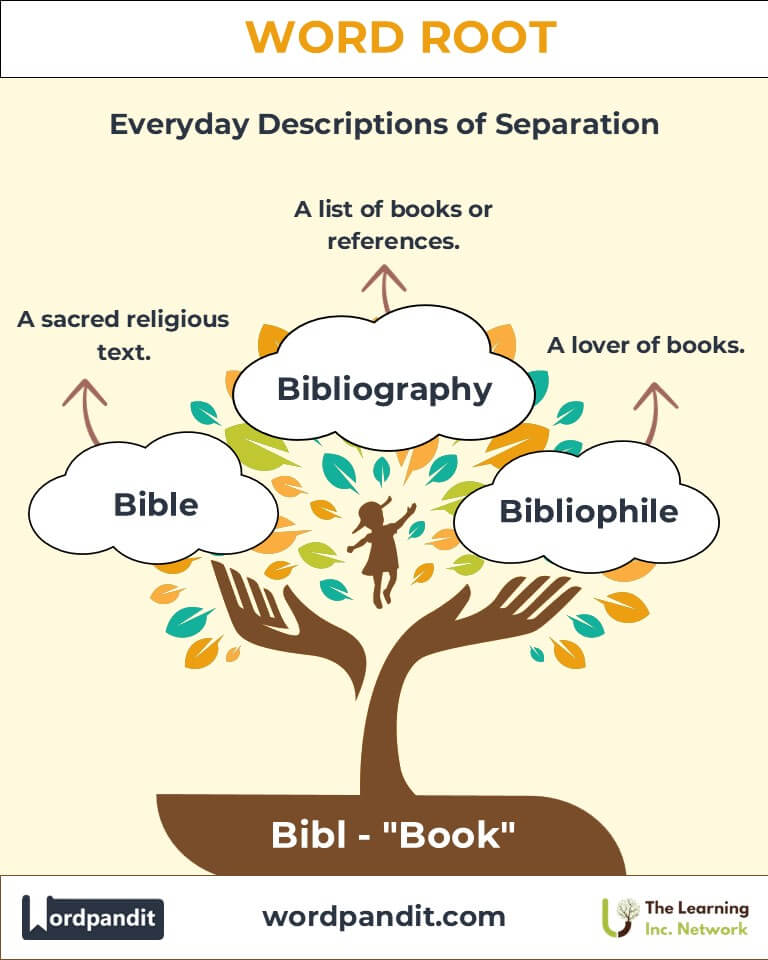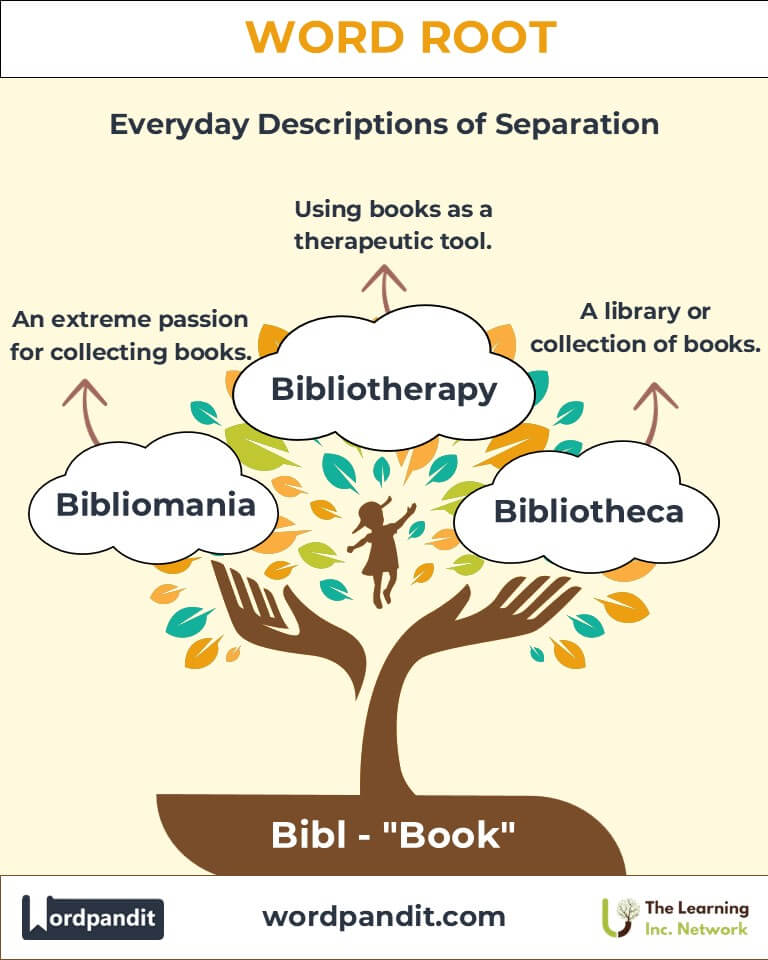Bibl: The Root of Books and Knowledge
Byline:
Explore the profound influence of the root "Bibl," derived from the Greek word biblion, meaning "book." From historical manuscripts to digital libraries, this root has shaped how we perceive and interact with knowledge, literature, and record-keeping throughout the centuries.

Table of Contents
- Introduction: The Essence of "Bibl"
- Etymology and Historical Journey
- Mnemonic: Unlocking the Power of "Bibl"
- Common "Bibl"-Related Terms
- "Bibl" Through Time
- "Bibl" in Specialized Fields
- Illustrative Story: "Bibl" in Action
- Cultural Significance of the "Bibl" Root
- The "Bibl" Family Tree
- FAQs about the "Bibl" Word Root
- Test Your Knowledge: "Bibl" Mastery Quiz
- Conclusion: The Living Legacy of "Bibl"
Introduction: The Essence of "Bibl"
What connects ancient manuscripts to your local library’s catalog? The root "Bibl," pronounced bib-l, meaning "book," offers the answer. Originating from Greek, this root has given rise to numerous terms associated with books, writing, and record-keeping. Its influence spans religion, academia, and digital innovation, underscoring the timeless human quest for knowledge.
Etymology and Historical Journey
The word "Bibl" stems from the Greek biblion, meaning "book" or "scroll," which itself is a diminutive of byblos, referring to papyrus. Ancient Greeks named the material after the Phoenician city of Byblos, renowned for exporting papyrus. This root evolved into Latin Biblia (books), eventually influencing terms such as "Bible" (the Book) and "bibliography."
Mnemonic: Unlocking the Power of "Bibl"
Mnemonic:
"Bibl is the beacon of books, guiding bibliophiles and bibliographers through the world of knowledge."
Visualize a towering bookshelf with golden letters spelling "BIBL," glowing with wisdom and inviting discovery.
Common "Bibl"-Related Terms
- Bible (bahy-buhl): A sacred religious text.
Example: "The Bible is a cornerstone of many religious traditions." - Bibliography (bib-lee-og-ruh-fee): A list of books or references.
Example: "The research paper included an extensive bibliography." - Bibliophile (bib-lee-oh-fahyl): A lover of books.
Example: "As a bibliophile, she spent weekends exploring old bookstores." - Bibliomania (bib-lee-oh-mey-nee-uh): An extreme passion for collecting books.
Example: "His bibliomania led to a house filled with rare manuscripts." - Bibliotheca (bib-lee-oh-thee-kuh): A library or collection of books.
Example: "The bibliotheca housed manuscripts dating back centuries."
"Bibl" Through Time
- Bible: Once referred to any book but later became synonymous with sacred texts due to its centrality in religious traditions.
- Bibliography: Initially a term for handwriting or book copying, it evolved into its modern meaning of reference lists.
"Bibl" in Specialized Fields
- Religion: The Bible is central to theological studies and worship.
- Academia: Bibliographies are essential for citing sources and maintaining academic integrity.
- Librarianship: Bibliotherapy uses books as therapeutic tools for mental health.
Illustrative Story: "Bibl" in Action
Lydia, a bibliophile, found solace in books during challenging times. When tasked with cataloging her university’s library, she uncovered an ancient manuscript that revealed forgotten historical events. Her discovery became a celebrated bibliography, showcasing how passion for "Bibl" can connect the past and present.
Cultural Significance of the "Bibl" Root
The root "Bibl" symbolizes humanity’s reverence for knowledge. From the Gutenberg Bible revolutionizing printing to modern bibliographies supporting research, "Bibl" reflects the enduring value of preserving and sharing wisdom.
The "Bibl" Family Tree
- Graph (write): Examples: Biography, autograph.
- Log (word, study): Examples: Philology, dialogue.
- Mania (madness): Examples: Bibliomania, mania.

FAQs About the "Bibl" Word Root
Q: What does "Bibl" mean?
A: The root "Bibl" comes from the Greek word biblion, which means "book" or "scroll." It serves as the foundation for many terms that relate to books, literature, and records, emphasizing the importance of written knowledge.
Q: Is the root "Bibl" exclusive to religious contexts?
A: No, while "Bible" (meaning "the Book") is a prominent religious term derived from this root, "Bibl" applies to a wide range of non-religious contexts as well, including terms like bibliography (a list of books) and bibliophile (a book lover).
Q: What is a bibliophile?
A: A bibliophile is someone who has a deep love for books. Unlike bibliomania, which may imply an obsessive collection of books, a bibliophile enjoys reading, appreciating, and collecting books for pleasure and knowledge.
Q: What is the difference between a bibliography and a bibliophile?
A: A bibliography refers to a structured list of books or references used in research, usually found at the end of academic or literary works. A bibliophile, on the other hand, is a person who loves books and may collect or read them passionately.
Q: How did the word "Bible" originate from "Bibl"?
A: The term "Bible" comes from the Greek ta biblia, meaning "the books." Initially used for a collection of sacred texts, the word reflects the high value placed on written works in religious traditions.
Q: What is bibliomania?
A: Bibliomania refers to an extreme passion or obsession with collecting books, often without regard to their value or content. This condition can sometimes lead to impractical or excessive accumulation of books.
Q: What does bibliotherapy mean?
A: Bibliotherapy is a practice that uses books as therapeutic tools to help individuals overcome psychological challenges, gain insights, or find solace. It’s a creative application of the "Bibl" root in the context of mental health.
Q: What is a bibliotheca?
A: Bibliotheca is an older term for a library or a collection of books. While less common in modern English, it reflects the classical origins of the word "Bibl."
Test Your Knowledge: "Bibl" Mastery Quiz
1. What does the root "Bibl" signify?
2. Which word means "lover of books"?
3. What does a bibliography represent?
4. What does bibliomania describe?
5. What is bibliotherapy?
Conclusion: The Living Legacy of "Bibl"
The root "Bibl" remains a cornerstone of intellectual and cultural heritage. From ancient papyrus scrolls to digital libraries, its legacy endures, reminding us of the transformative power of books. Embrace the spirit of "Bibl" and let it guide your journey through the boundless world of knowledge.













